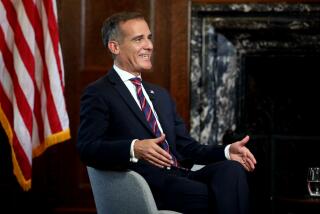S. Africa Recalls Its Envoy to U.S. : Displeasure Shown Over Criticism, Sanctions Bid
JOHANNESBURG, South Africa â Angered by mounting American criticism of its domestic and foreign policies, South Africa recalled its ambassador to the United States for consultations Tuesday.
The step was intended to show considerable diplomatic displeasure without breaking formal relations between the two countries.
Herbert Beukes, who had yet to present his credentials to President Reagan and thus remained ambassador-designate after more than two months in Washington, was told late Tuesday to return immediately to Pretoria, a Foreign Ministry spokesman said.
Beukes is expected to be back home by the end of the week for a stay that was described only as âindefiniteâ and that could last several months.
The ambassador-designate will brief Foreign Minister Roelof F. (Pik) Botha and probably President Pieter W. Botha on relations with the United States. However, his recall was immediately interpreted by Western diplomats as South Africaâs response to recent American protests about the state of emergency in 36 cities and towns here and to the likely U.S. imposition of economic sanctions.
âPretoria is moving to end âconstructive engagementâ before Washington can,â a senior Western diplomat said. âSouth Africa knows that the U.S. policy of constructive engagement will not survive the Reagan Administrationâs current policy review, and so it is moving to break off that relationship before the United States can do so. . . .
âBesides, after all the recent humiliation South Africa has suffered abroad, this letâs-get-tough-with-Washington plays well at home.â
In Washington, a senior State Department official said the United States had delayed accepting Beukesâ credentials--in effect, refusing to recognize him formally as ambassador--as a sign of its dissatisfaction with South Africaâs state of emergency.
The recall of an ambassador is one of diplomacyâs traditional signals of displeasure. The United States recalled its envoy to Pretoria, Ambassador Herman W. Nickel, last month to protest a series of South African military raids into neighboring Botswana and Angola. Officials have since said that Nickel may not return to Pretoria until the state of emergency is lifted.
French Envoy Leaves
On Sunday, the French ambassador left Pretoria in protest over the state of emergency, decreed 10 days ago and aimed at quelling a year of civil unrest. And the U. N. Security Council last week called for voluntary international sanctions on South Africa until it ends it apartheid policies of racial segregation.
âWe are now at the lowest point we have ever been in our international relations,â Frederik van Zyl Slabbert, leader of the liberal, white opposition Progressive Federal Party, said, expressing his concern that the Botha governmentâs tough reactions to foreign criticism are isolating South Africa even more.
South African officials declined Tuesday night to discuss the reasons for Beukesâ recall or current relations with the United States.
However, a commentary broadcast this morning on the state-run radio portrayed the government as having only two choices: improving its international relations by âgiving in to the demandsâ of blacks and lifting the emergency regulations, or braving widespread criticism at home and abroad and restoring law and order here.
âOnslaught Against Reformâ
âThe onslaught is against the democratic reform process itself,â the commentator said, reflecting government views, âand allowing it to continue would amount to abetting the destruction of the democratic ideal in South Africa.â
Louis le Grange, the minister of law and order, said in a visit to Port Elizabeth on Tuesday that the government will use its emergency powers shortly to curb the highly political funerals held for black victims of the unrest.
âWe will see to it in future that funerals will not be political gatherings,â Le Grange said. Restrictions on the size of funerals and on the number of persons allowed to speak will be published shortly, he added.
Meetings of black anti-government groups have been banned for the last four months in eastern Cape province and other parts of the country, and the funerals for unrest victims, most of whom have been shot by police, have increasingly become mass protest gatherings.
Police headquarters in Pretoria announced on Tuesday the detention of 44 more people under the emergency regulations, bringing to 1,259 the number arrested without charge since the state of emergency was declared. It also said 13 people have been released, the first to be freed.
Conferees Meet Today
Meanwhile, in Washington, House and Senate negotiators prepared to sit down today in an attempt to reconcile differences in anti-apartheid legislation passed by each chamber. Both bills impose economic sanctions on South Africa, but the Senate version is milder.
Key Democrats in the House indicated for the first time Tuesday that they would be willing to soften the terms of their bill in order to facilitate a compromise. But they also insisted that they will still demand a final product tougher than the Senate bill and would be willing to postpone action until after the traditional congressional August recess in order to get their way.
âItâs better to do nothing than to pretend weâre doing something and pass a piece of legislation that is full of loopholes,â said California Rep. Howard L. Berman (D-Studio City), one of the House negotiators.
Berman said Democratic sponsors would drop a provision in the House bill banning new American investment in South Africa.
In exchange, he said, the Democrats want Senate Republicans to either end their opposition to a ban on U.S. sales of gold Krugerrand coins, one of South Africaâs most lucrative foreign exchange earners, or agree to an automatic ban on investment and sale of the coins in one year unless President Reagan and Congress agree that Pretoria had made progress in eliminating apartheid.
Times staff writers Doyle McManus and Bob Secter, in Washington, contributed to this story.
More to Read
Sign up for Essential California
The most important California stories and recommendations in your inbox every morning.
You may occasionally receive promotional content from the Los Angeles Times.










